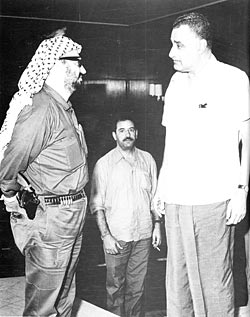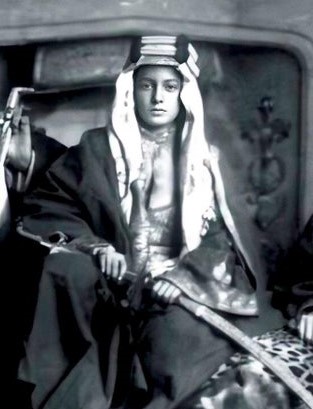|
Khaled Al-Hassan
Khaled al-Hassan ( ar, خالد الحسن also known as Abu Said ar, أبو السعيد) (1928-1994) was an early adviser of Yasser Arafat, PLO leader and a founder of the Palestinian political and militant organization Fatah. Khaled was the older brother of Hani al-Hassan. Early life Al-Hassan was born in Haifa in 1928. He and his family lived there until they were exiled as refugees after Israel's capture of the city in the 1948 Arab-Israeli War, which he participated in on the side of Palestinian Arab forces. His family settled in Sidon, Lebanon, but he left for Egypt. He was briefly detained in Egypt "just for being Palestinian" according to him. After being released, he reunited with his family in Lebanon where he lived briefly.Cobban, 1984, pp.22-23. In 1949 he formed the short-lasing commando group Tahrir Filastin. A year later he moved to Syria. During this time, al-Hassan worked as a teacher in Damascus and he helped found the Islamic Liberation Party in 1952. Syrian ... [...More Info...] [...Related Items...] OR: [Wikipedia] [Google] [Baidu] |
Khalil Al-Wazir
Khalil Ibrahim al-Wazir Standardized Arabic transliteration: '' / / '' ( ar, خليل إبراهيم الوزير, also known by his '' kunya'' Abu JihadStandardized Arabic transliteration: ' —"Jihad's Father"; 10 October 1935 – 16 April 1988) was a Palestinian leader and co-founder of the nationalist party Fatah. As a top aide of Palestine Liberation Organization (PLO) Chairman Yasser Arafat, al-Wazir had considerable influence in Fatah's military activities, eventually becoming the commander of Fatah's armed wing al-Assifa. Al-Wazir became a refugee when his family was expelled from Ramla during the 1948 Arab–Israeli War, and began leading a minor ''fedayeen'' force in the Gaza Strip. In the early 1960s he established connections for Fatah with Communist regimes and prominent third-world leaders. He opened Fatah's first bureau in Algeria. He played an important role in the 1970–71 Black September clashes in Jordan, by supplying besieged Palestinian fighters with weap ... [...More Info...] [...Related Items...] OR: [Wikipedia] [Google] [Baidu] |
Gamal Abdel Nasser
Gamal Abdel Nasser Hussein, . (15 January 1918 – 28 September 1970) was an Egyptian politician who served as the second president of Egypt from 1954 until his death in 1970. Nasser led the Egyptian revolution of 1952 and introduced far-reaching land reforms the following year. Following a 1954 attempt on his life by a Muslim Brotherhood member, he cracked down on the organization, put President Mohamed Naguib under house arrest and assumed executive office. He was formally elected president in June 1956. Nasser's popularity in Egypt and the Arab world skyrocketed after his nationalization of the Suez Canal Company and his political victory in the subsequent Suez Crisis, known in Egypt as the ''Tripartite Aggression''. Calls for pan-Arab unity under his leadership increased, culminating with the formation of the United Arab Republic with Syria from 1958 to 1961. In 1962, Nasser began a series of major socialist measures and modernization reforms in Egypt. Despite setba ... [...More Info...] [...Related Items...] OR: [Wikipedia] [Google] [Baidu] |
Mohammad Hassanein Heykal
Mohamed Hassanein Heikal ( ar, محمد حسنين هيكل; 23 September 1923 – 17 February 2016) was an Egyptian journalist. For 17 years (1957–1974), he was editor-in-chief of the Cairo newspaper ''Al-Ahram'' and was a commentator on Arab affairs for more than 50 years. Heikal articulated the thoughts of President Gamal Abdel Nasser earlier in his career. He worked as a ghostwriter for the Egyptian president Gamal Abdel Nasser and represented the ideology of pan-Arabism. Heikal was a member of the Central Committee of the Arab Socialist Union (Egypt), Arab Socialist Union. He was appointed minister of information in April 1970 but resigned from government in 1974 over differences with Anwar Sadat. In September 2003, upon reaching the age of 80, Heikal wrote an article in the monthly magazine ''Weghat Nazar'' (where he had been writing for some time) that the time had come for an "old warrior" to put down his pen and take to the sidelines. Heikal stressed that his dec ... [...More Info...] [...Related Items...] OR: [Wikipedia] [Google] [Baidu] |
Saudi Riyal
The Saudi riyal ( ar, ريال سعودي ') is the currency of Saudi Arabia. It is abbreviated as or SAR ''(Saudi Arabian Riyal)''. It is subdivided into 100 halalas ( ar, هللة '). The currency is pegged to the US dollar at a constant rate of exchange. History The riyal has been the currency of Saudi Arabia since the country came into being and was the currency of Hejaz before Saudi Arabia was created, one of the primary currencies in the Mediterranean region during the Ottoman era. The Hejaz riyal was based on but not equivalent to the Ottoman 20 kuruş coin and was consequently divided into 20 qirsh. However, although the Hejaz riyal was the same weight as the Ottoman 20 kuruş, it was minted in .917 fineness, compared to .830 fineness for the Ottoman coin. Thus, because the first Saudi riyal had the same specifications as the Hejaz riyal and circulated alongside Ottoman coins, it came to be worth 22 Ottoman kuruş and was consequently subdivided into 22 ghirsh when coins ... [...More Info...] [...Related Items...] OR: [Wikipedia] [Google] [Baidu] |
Faisal Of Saudi Arabia
Faisal bin Abdulaziz Al Saud ( ar, فيصل بن عبدالعزيز آل سعود ''Fayṣal ibn ʿAbd al ʿAzīz Āl Suʿūd'', Najdi Arabic pronunciation: ; 14 April 1906 – 25 March 1975) was a Saudi Arabian statesman and diplomat who was King of Saudi Arabia from 2 November 1964 until his assassination in 1975. Prior to his ascension, he served as Crown Prince of Saudi Arabia from 9 November 1953 to 2 November 1964, and he was briefly regent to his half-brother King Saud in 1964. He was prime minister from 1954 to 1960 and from 1962 to 1975. Faisal was the third son of King Abdulaziz, the founder of modern Saudi Arabia, and the second of Abdulaziz's six sons who were kings. Faisal was the son of Abdulaziz and Tarfa bint Abdullah Al Sheikh. His father was still reigning as Emir of Nejd at the time of Faisal's birth, and his mother was from the Al ash-Sheikh family which has produced many prominent Saudi religious leaders. Faisal emerged as an influential royal politician ... [...More Info...] [...Related Items...] OR: [Wikipedia] [Google] [Baidu] |
Palestine Liberation Organization
The Palestine Liberation Organization (PLO; ar, منظمة التحرير الفلسطينية, ') is a Palestinian nationalism, Palestinian nationalist political and militant organization founded in 1964 with the initial purpose of establishing Pan-Arabism, Arab unity and History of the State of Palestine, statehood over the territory of former Mandatory Palestine, in opposition to the Israel, State of Israel. In 1993, alongside the Oslo I Accord, the PLO's aspiration for Arab statehood was revised to be specifically for the Palestinian territories under an Israeli-occupied territories, Israeli occupation since the Six-Day War, 1967 Arab–Israeli War. It is headquartered in the city of Al-Bireh in the West Bank, and is recognized as the sole legitimate representative of the Palestinians, Palestinian people by over 100 countries that it has diplomatic relations with.Madiha Rashid Al-Madfai, ''Jordan, the United States and the Middle East Peace Process, 1974–1991'', Cambri ... [...More Info...] [...Related Items...] OR: [Wikipedia] [Google] [Baidu] |
Palestine Liberation Organization Executive Committee
The Executive Committee of the Palestine Liberation Organization (PLO EC) ( ar, اللجنة التنفيذية لمنظمة التحرير الفلسطينية) is the highest executive body of the Palestine Liberation Organization (PLO), and acts as the government of the State of Palestine.''Abbas confirms resignation from PLO Executive Committee'' . The Middle East Monitor, 24 August 2015 "The Palestinian National Council also empowered the central council to form a government-in-exile when appropriate, and the executive committee to perform the functions of government until such time as a government-in-exile was established." [...More Info...] [...Related Items...] OR: [Wikipedia] [Google] [Baidu] |
Tripoli, Lebanon
Tripoli ( ar, طرابلس/ALA-LC: ''Ṭarābulus'', Lebanese Arabic: ''Ṭrablus'') is the largest city in northern Lebanon and the second-largest city in the country. Situated north of the capital Beirut, it is the capital of the North Governorate and the Tripoli District. Tripoli overlooks the eastern Mediterranean Sea, and it is the northernmost seaport in Lebanon. It holds a string of four small islands offshore. The Palm Islands were declared a protected area because of their status of haven for endangered loggerhead turtles (''Chelona mydas''), rare monk seals and migratory birds. Tripoli borders the city of El Mina, the port of the Tripoli District, which it is geographically conjoined with to form the greater Tripoli conurbation. The history of Tripoli dates back at least to the 14th century BCE. The city is well known for containing the Mansouri Great Mosque and the largest Crusader fortress in Lebanon, the Citadel of Raymond de Saint-Gilles. It has the second hig ... [...More Info...] [...Related Items...] OR: [Wikipedia] [Google] [Baidu] |
Iraq
Iraq,; ku, عێراق, translit=Êraq officially the Republic of Iraq, '; ku, کۆماری عێراق, translit=Komarî Êraq is a country in Western Asia. It is bordered by Turkey to Iraq–Turkey border, the north, Iran to Iran–Iraq border, the east, the Persian Gulf and Kuwait to the southeast, Saudi Arabia to the south, Jordan to Iraq–Jordan border, the southwest and Syria to Iraq–Syria border, the west. The Capital city, capital and largest city is Baghdad. Iraq is home to diverse ethnic groups including Iraqi Arabs, Kurds, Iraqi Turkmen, Turkmens, Assyrian people, Assyrians, Armenians in Iraq, Armenians, Yazidis, Mandaeans, Iranians in Iraq, Persians and Shabaks, Shabakis with similarly diverse Geography of Iraq, geography and Wildlife of Iraq, wildlife. The vast majority of the country's 44 million residents are Muslims – the notable other faiths are Christianity in Iraq, Christianity, Yazidism, Mandaeism, Yarsanism and Zoroastrianism. The official langu ... [...More Info...] [...Related Items...] OR: [Wikipedia] [Google] [Baidu] |
Gaza City
Gaza (;''The New Oxford Dictionary of English'' (1998), , p. 761 "Gaza Strip /'gɑːzə/ a strip of territory in Palestine, on the SE Mediterranean coast including the town of Gaza...". ar, غَزَّة ', ), also referred to as Gaza City, is a Palestinian city in the Gaza Strip, with a population of 590,481 (in 2017), making it the largest city in the State of Palestine. Inhabited since at least the 15th century BCE, Gaza has been dominated by several different peoples and empires throughout its history. The Philistines made it a part of their pentapolis after the Ancient Egyptians had ruled it for nearly 350 years. Under the Roman Empire Gaza experienced relative peace and its port flourished. In 635 CE, it became the first city in Palestine to be conquered by the Muslim Rashidun army and quickly developed into a center of Islamic law. However, by the time the Crusaders invaded the country starting in 1099, Gaza was in ruins. In later centuries, Gaza experienced several ... [...More Info...] [...Related Items...] OR: [Wikipedia] [Google] [Baidu] |
Saudi Arabia
Saudi Arabia, officially the Kingdom of Saudi Arabia (KSA), is a country in Western Asia. It covers the bulk of the Arabian Peninsula, and has a land area of about , making it the fifth-largest country in Asia, the second-largest in the Arab world, and the largest in Western Asia and the Middle East. It is bordered by the Red Sea to the west; Jordan, Iraq, and Kuwait to the north; the Persian Gulf, Qatar and the United Arab Emirates to the east; Oman to the southeast; and Yemen to the south. Bahrain is an island country off the east coast. The Gulf of Aqaba in the northwest separates Saudi Arabia from Egypt. Saudi Arabia is the only country with a coastline along both the Red Sea and the Persian Gulf, and most of its terrain consists of arid desert, lowland, steppe, and mountains. Its capital and largest city is Riyadh. The country is home to Mecca and Medina, the two holiest cities in Islam. Pre-Islamic Arabia, the territory that constitutes modern-day Saudi Ar ... [...More Info...] [...Related Items...] OR: [Wikipedia] [Google] [Baidu] |
.jpg)





